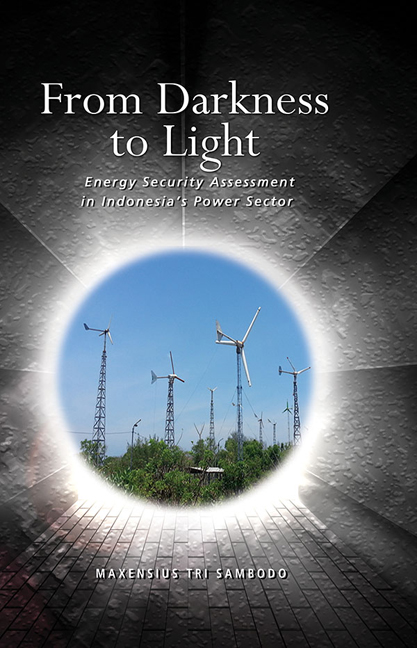Book contents
- Frontmatter
- Dedication
- Contents
- List of Tables
- List of Figures
- List of Abbreviations
- Acknowledgements
- 1 Introduction
- 2 A Historical Overview of the Electricity Sector
- 3 Electricity Production and Consumption: Boom and Bust
- 4 Economic Crisis and Its Impact on the Power Sector
- 5 Electricity and Economic Growth
- 6 Electricity and the Environment
- 7 The Rural Electricity Programme in Indonesia
- 8 Conclusion
- Index
- About the Author
- Frontmatter
- Dedication
- Contents
- List of Tables
- List of Figures
- List of Abbreviations
- Acknowledgements
- 1 Introduction
- 2 A Historical Overview of the Electricity Sector
- 3 Electricity Production and Consumption: Boom and Bust
- 4 Economic Crisis and Its Impact on the Power Sector
- 5 Electricity and Economic Growth
- 6 Electricity and the Environment
- 7 The Rural Electricity Programme in Indonesia
- 8 Conclusion
- Index
- About the Author
Summary
Based on the energy security framework analysis, this book came to the conclusion that although the five dimensions (regulation and governance, availability, technology development and efficiency, environmental sustainability, and affordability) are interconnected, they need to be treated with different priorities. This book pointed out that regulation and governance needs to be at the centre of electricity sector discussion in Indonesia. This implies that scholars need to set different weights when assessing the ranks of the five dimensions in the case of Indonesia. The analysis suggested that regulation and governance needs to be placed as the core of improving energy security, followed by availability, technology development and efficiency, environmental sustainability, and affordability dimensions.
Reviews on the historical perspective indicated that since the first trading of electricity in Indonesia in May 1897, in terms of the regulation and governance dimension, Indonesia has not developed a mature and stable environment for electricity business. We need to highlight that the period of Japanese colonization, political struggle in the early independence period, the economic crisis at the end of the old order regime, internal conflict within PLN organization, the economic crisis in 1997/98, the collapse of the Soeharto regime, and increasing electricity subsidies have affected the development of the electricity sector in Indonesia. Lack in incorporating the national interest into a clear policy direction and lack in institutionalizing good policies had led to inefficiency and spread of rent-seeking behaviour. Good governance and good corporate governance need to move in the same direction, one needs to reinforce the other in a positive way. The future performance of the electricity sector depends on how regulation and governance can create business opportunities and economic stability.
Although the New Order period could have created a certain level of political and economic stability that was necessary for the development of the power sector, the strategies were constructed under two weak foundations. First, in order to improve the availability of power supply, the government has allowed the private sector to generate electricity and sell it to PLN. Unfortunately, improper contract agreements (a lack of transparency) and the strong involvement of Soeharto's cronies in some of the dealings caused PLN problems which later became complex and serious. Currently, the government has prepared regulations and standard procedures for independent power producer (IPP) procurement, but this will not automatically result in better outcomes.
- Type
- Chapter
- Information
- From Darkness to LightEnergy Security Assessment in Indonesia's Power Sector, pp. 176 - 180Publisher: ISEAS–Yusof Ishak InstitutePrint publication year: 2016

